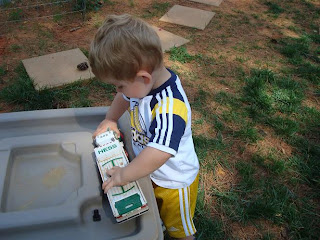I have been thinking a lot about the Privacy part of the scales. Specifically #6 in the FCCERS book. I have some great ideas on how I can incorporate some little areas of calm and privacy in our space... but today I was walking around the yard watching my little friends play. I saw some playing together in groups, some individually, and some with just 2 kids playing together. There were no closed off spaces. There were no walls or barriers to keep friends OUT. Just an unspoken calm of, "I, or We, want to be alone right now" that the other kids respected.




No one asked to be left alone to play. No one walked up to a friend to intrude or wrangle with... they respected each others space and what they were doing at the moment. I don't think I ever specifically or consciously taught them the "Give your friends space" rule. I recall helping them to use their words to express their need for space, but other than that, it seems to come naturally (ok, most of the time :)... We're not perfect)
Being outside, it seems like it would be hard to find that alone spot, but they do it. Inside, I will find one at the Sand Studio, or writing alone at the writing table, engrossed in their own reality... present in the moment only. To me, privacy doesn't always have to be about books, pillows or secluded from the group... it has more to do with the calm each child finds in their own way. It CAN be at the easel engrossed in the way paint mixes together, at the nature table inspecting insects or seaweed, at the manipulative's table working with a friend to make a Lincoln Log town, or it can be at the Cozy Corner with a great picture book. Each child's needs are different, and they each have a different way to recharge. Heck, sometimes they need a different quiet experience every hour :) I think I finally have them figured out... and they go and change the whole dynamic on me.
So, I will make sure I have what my FCCERS book says I should have to provide for this "privacy" aspect of my program, but I will continue to marvel at the many different ways each child finds to meet that need of quiet on their own. I will also keep you posted on my quest for my Stars!!! I am sure this won't be my last rant about something I have read in the FCCERS book :)
Rant away girl.. it is not easy. The thing is once you get it under your belt for a couple of years, it is all second hand. Then you can really begin to enjoy the benefits of having your program set up this way. A mom gave me a great compliment the other day. We are licensed for 16. A prospective mom said she just felt like that was too much. I will give her that.. it does sounds like a lot in one house. BUT, our home is very large and there are always two of us here and there are no mixed ages. Anway.. ( sorry I wandered ) This mom said " but when you walk in it doesnt FEEL like there are that many kids, I dont know how to explain it. There are little nooks and crannies everywhere and they are all busy. At first I was overwhelmed with FCCRS and now I see how much better it has made my life. It made me think outside of my norm. I dont agree with it all , but I have learned to appreciate the reasons behind it. DId that make sense? Did I email you my checklist?
ReplyDeleteI am a home childcare provider. I only care for 2-5 year olds and focus on a preschool centered environment. Would the FCCRS be good for me to use even though I dont have infants and young toddlers? This may sound silly...but what do you do once you have achieved the standards in FCCRS? Is that it or is there some sort of certification. I have not wanted to get accredited because of the money involved and the annual renewals seem tedious. But I do want a guideline for improving my program. Would FCCRS meet this need? Thanks!
ReplyDeleteI know exactly what you mean, and I have ranted about the same thing! Actually, I just did yesterday to my consultants. The rating scales and best practice recommendations and standards don't always take into consideration what is our actual reality. It doesn't take into consideration how well we know these kids, and how we use that information to determine how we can actually do things.
ReplyDeleteBy the way, I've seen that same thing here with the privacy moments. I only have one kid that has to be reminded to respect the other kids' needs for alone time.